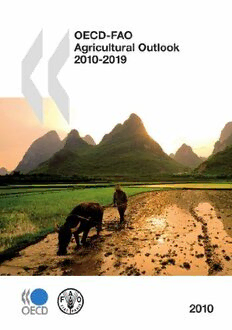
OECD-FAO Agricultural Outlook 2010-2019 PDF
251 Pages·2010·4.729 MB·English
Most books are stored in the elastic cloud where traffic is expensive. For this reason, we have a limit on daily download.
Preview OECD-FAO Agricultural Outlook 2010-2019
Description:
This is the sixteenth edition of the Agricultural Outlook and the sixth co-edition prepared by the Organisation for Economic Cooperation and Development (OECD) and the Food and Agriculture Organization of the United Nations (FAO). This edition covers the outlook for commodity markets during the 2010 to 2019 period, and brings together the commodity, policy and country expertise of both organisations. The report analyses world market trends for the main agricultural products, as well as for biofuels. It provides an assessment of agricultural market prospects for production, consumption, trade, stocks, and prices of the commodities analysed. The macroeconomic assumptions that condition the commodity projections examined are more positive in this years edition as compared to last year. The anticipated return to global economic growth, a rising population, emerging biofuel markets, and a higher cost structure are expected to underpin international commodity markets and prices over the outlook period under study. Developing countries are expected to be the driving force behind the expected growth in agricultural production, consumption and trade. The projections and past trends are presented in the statistical annex and can be viewed in more detail at www.agri-outlook.org. This years report also includes a special section on price volatility and price transmission from world to domestic markets. Governments are concerned about price volatility because it affects farm viability, food security and needed investment. The report analyses the evidence of and changes in price volatility over the longer term and summarises policy advice from both FAO and OECD on this issue.
See more
The list of books you might like
Most books are stored in the elastic cloud where traffic is expensive. For this reason, we have a limit on daily download.
